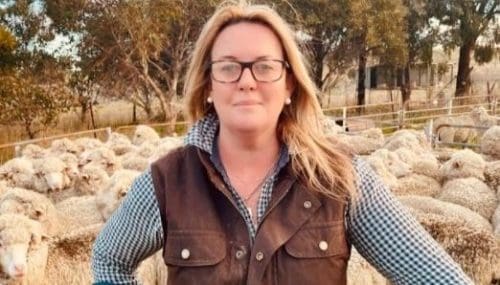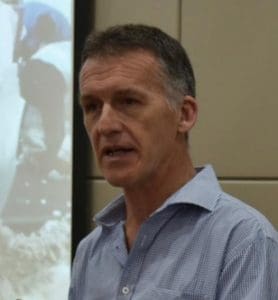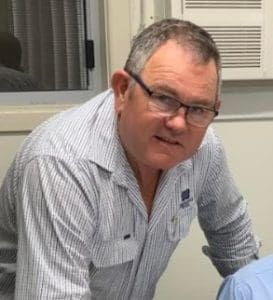
WoolProducers Australia CEO Jo Hall.
NATIONAL wool broker, exporter, levy, marketing and testing bodies have collaborated on developing a single traceability system, but left peak grower body WoolProducers Australia out of discussions.
The industry’s peak broker and exporter bodies share the desire of international buyers and processors for Australia to have a single wool traceability integrity system.
Australia’s exporter and broker bodies have been encouraging Australian Wool Innovation to focus on developing the traceability components of AWI’s WoolQ platform — that has cost $6.3 million up to 2021 — despite the presence of the Australian Wool Exchange’s SustainaWOOL scheme.
And today the Australian Council of Wool Exporters and Processors, AWEX, Australian Wool Innovation and the National Council of Wool Selling Brokers of Australia said they have been “jointly working to develop a mechanism that sets the industry up for success into the future.”
In a joint statement, the bodies said they had undertaken extensive discussions over the past nine months to assess the current industry landscape as well as the challenges and opportunities that exist now and in the future. More recently the group also involved the Australian Wool Testing Authority “to bolster a more comprehensive industry approach”.
The bodies said the key focus of this collaboration is to allow the Australian industry to better meet the evolving needs of their global customer base in terms of sustainability and traceability. Additionally, it will assist in addressing the growing threat of an exotic animal disease (EAD) outbreak.
To achieve these outcomes, the groups said they believe the key success factor will be to work together as an industry and utilize the multiple digital assets that already exist in the industry today. In doing so, the industry can leverage its highly developed and trusted assets to validate Australian wool credentials for our global customer base, they said.
The discussions have seemingly involved all members of another ‘peak’ industry body – Wool Industries Australia – except AWH and WPA.
Lack of WPA involvement is ‘extremely disappointing’
WPA chief executive officer Jo Hall said she was extremely disappointed that the grower body had not been asked to participate in the group’s discussions.
“WoolProducers has been working hard on a number of issues across industry to try and bring collaboration and unity to the industry, including, but not limited to, the establishment of the Wool Traceability Working Group, Post-Farm Gate Emergency Animal Disease Working Group and the Domestic and Diversified Wool Processing Steering Group, which all of AWI, AWEX, AWTA, ACWEP and the NCWSBA are part of.
“It is therefore extremely disappointing that we have not been included in these talks as many of the identified issues were raised in the forums that WoolProducers have convened. As our industry shrinks, the last thing we need is the establishment of another group to perpetuate duplication of work,” she said.
“But what is truly mind blowing about this statement is that the three service providers and the broker and exporter sectors who are talking about future proofing the industry, didn’t have the inclination to include wool grower representation in their discussions, when the entire industry and their organisations would not exist without woolgrowers.”
The five bodies said that over the last 12 months, key industry initiatives had included:
- Digitalisation with e-speci collaboration between AWEX and AWI
- eBale – from July 2023 every wool pack imported into Australia will carry technology that will allow traceability from farm to retailer
- AWI/Woolmark Supply Chain Builder software tool developed by Everledger to assist wool growers and their customers with traceability and validation.
- Very significant growth in the capture and transfer of PIC data by sellers to AWTA which would facilitate rapid response in the event of an EAD outbreak.
- Sheep Sustainability Framework – funded by AWI and MLA ACWEP President Josh Lamb says co-operation across the industry is the key.
Co-operation is the key – Lamb

Wool exporter Josh Lamb at a wool conference in China.
ACWEP president Josh Lamb said co-operation across the industry is key.
“Australian wool is recognised among its customer countries as the world’s best for its quality.
“There is also recognition within the industry that there is an increasing requirement to demonstrate to Australia’s global customer base that Australian wool is grown, processed and transported in accordance with emerging international Standards for Sustainability and Traceability,” he said.
“The Australian wool industry is coming together to ensure it remains the world’s premier wool clip for future generations.”
Mr Lamb said no wool industry group was deliberately excluded from these discussions on creating Australia’s own integrity scheme.
“It’s very early stages yet and for this idea to be successful we need all of industry collaborating and all of industry support going forward.
“AWEX and AWI as service providers, NCWSBA as sellers and ACWEP as buyers met last year to discuss various commercial issues in the industry post farmgate.
“Having more control of the narrative around integrity and traceability was one major issue that came up,” he said.
“WPA has already done a lot of work in this space and the industry will be drawing on that as part of a greater process.
“The focus today should be the industry putting growers’ best interests at the forefront for the future.”
Industry collaboration can leverage assets – Grave

AWEX CEO Mark Grave
AWEX CEO Mark Grave agreed with Mr Lamb’s comments about the need for co-operation.
“The Australian wool industry has continued to develop and implement innovative solutions for the benefit of all industry participants.
“The investment in cutting edge technology underpins our integrity programs, information systems and quality schemes,” he said.
“These systems have been developed in consultation with our stakeholders, spanning from the wool producing farms through to the manufacturers, and ultimately the retailer and consumers.
“By working collaboratively, the Australian wool industry can leverage these assets and maintain Australia’s position as the foremost and preferred supplier of premium quality wool to the world.”
Although WPA was not included in the joint statement, Mr Grave said the growers were “a part of it.”
“That release was made by groups that have met together to discuss the practical programs and assets that we’ve built.
“I suppose for us to go forward we have to have the support of the grower groups to make it work and we’ve certainly sought that on the individual programs when they’ve come through,” he said.
“But I think this is really the groundwork and I think you will see more collaboration.”
Mr Grave would not directly comment on what the discussions would mean for SustainaWOOL, nor whether they were aimed at developing a single Australian traceability system or scheme.
“Australia already has a number of pieces to the traceability/integrity puzzle, developed over many years.
“All were developed in consultation with growers,” he said.
“As service providers, by collaborating, we can take advantage of all of these services to have a robust system.”
A strong case for collaboration – Roberts

AWI CEO John Roberts
AWI CEO John Roberts said there is a strong case for industry wide collaboration.
“We know that any success in this space will only be achieved via an all of industry approach to the challenge of an ever-growing shift towards sustainability and traceability.
“It’s something that our international customers are demanding and it will be benefit Australian wool growers,” he said.
“The most pressing driver is the need to effectively address exotic animal disease outbreaks particularly after the FMD scare,” Mr Roberts said.
“Being able to easily locate and isolate impacted bales of wool will be critical is avoiding a full-scale trade lock down of the entire wool trade.
“There are a number of digital building blocks already built including a combined E-Speci (WoolClip), eBale, Sheep Sustainability Framework, WoolQ traceability data base, National Wool Declaration (NWD), AWTA test and PIC data, a distributed ledger (blockchain) platform that can deal with these issues with the right interoperability.”
He also added that, “it is important to acknowledge the solid inroads that have already been made in terms of existing integrity systems available in the market place. Any developments stemming from this industry collaboration will be intended to complement and support these systems through enhanced digital validation and reduced administration, rather than compete with them”.
When asked why AWI and the other bodies had not involved WoolProducers Australia in the discussions, Mr Roberts said: “AWI is working with wool industry service providing bodies on this.”
“WoolProducers Australia (WPA) has provided a key initiative in the traceability space in 2021 when they conducted a feasibility study, this contributed to the industry’s better understanding in this area.
“AWI appreciates and acknowledges WPA’s work on traceability.”
He said today’s announcement is about highlighting the collaboration by wool industry service bodies and should be welcomed.
“AWI is always happy to work with wool industry representative bodies, but today’s announcement is about the service providing bodies in the industry and their joint efforts.”
Unity is one the industry’s biggest challenges – Woods

NCWSBA president Rowan Woods.
NCWSBA president Rowan Woods said one of the biggest challenges facing the Australian wool industry is our ability to be united and to remove as much as possible any duplication.
“Like any industry, the Australian wool industry needs to embrace new technology and investment to ensure the industry remains as profitable and competitive as possible. The building blocks are in place. Moving forward we need to maximise the benefits by leveraging the good work across the different organisations in the Australian wool industry.”
Further, on the changing global landscape and market requirements Mr Woods said “growing legislative requirements continue to evolve around sustainability both overseas and here in Australia. This requires both listening to customers, but equally, having the mechanisms and safeguards to avoid unreasonable expectations being imposed on Australian wool growers and industry participants. It is critical that we, as an industry provide governments and global customers with the sustainable solutions by showcasing all the good work that is being done by our world leading wool industry.”
In the coming 12 months industry groups will continue to meet regularly to pool their knowledge to the benefit of the Australian wool industry. This will include identifying the key digital assets that already exist within the industry and how they can best be integrated to serve industry participants and our global customers.
AWTA managing director Michael Jackson said AWTA is trusted to handle data of brokers, merchants and exporters independently and without threatening any commercial relationships through the supply chain.
AWTA’s test database is a potential foundation for traceability and integrity platforms and it welcomes the opportunity to work with other organisations for the industry’s benefit.”

HAVE YOUR SAY